Analysing Organisational Communication at Mr Fishy: A Report
VerifiedAdded on 2021/02/22
|9
|2117
|78
Report
AI Summary
This report provides a comprehensive analysis of organisational communication within the context of Mr. Fishy. It begins with an introduction to the concept of organisational communication, emphasizing the exchange of information and its importance for both internal and external stakeholders. A literature review explores the definition and significance of organisational communication, referencing various sources. The analysis and discussion section delves into different forms of organisational communication, including formal and informal channels, along with oral and verbal communication. The report then applies principles of effective communication to enhance practices within Mr. Fishy, focusing on clarity, objectivity, consistency, completeness, and feedback. Furthermore, it evaluates communication practices, including establishing communication channels, gathering employee feedback, and resolving conflicts. The report also discusses effective practices for others, such as emotional intelligence and empathy. In conclusion, the report highlights the role of organisational communication in fostering ethical practices and achieving business objectives, underscoring the importance of legal channels and clear communication to achieve goals.
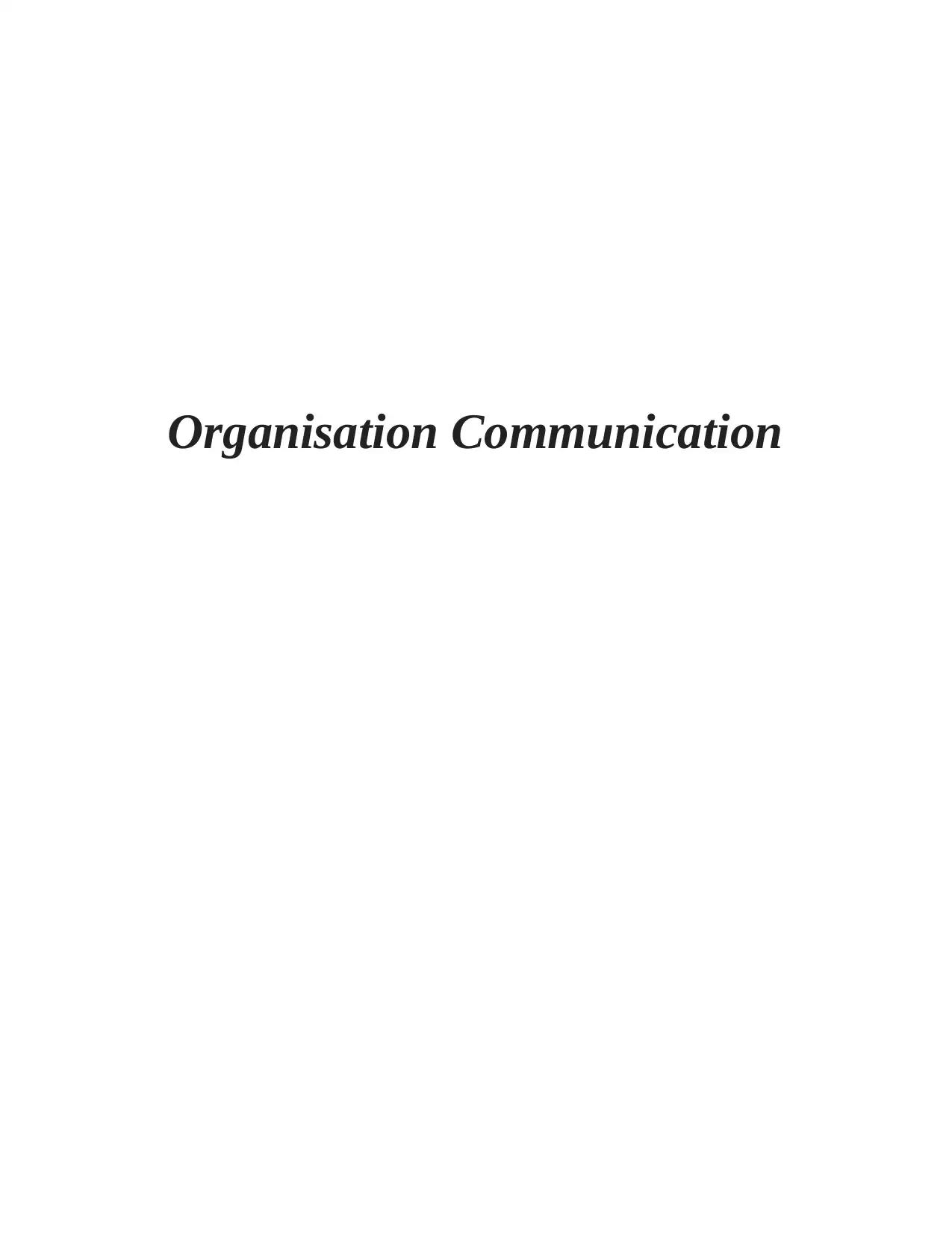
Organisation Communication
Paraphrase This Document
Need a fresh take? Get an instant paraphrase of this document with our AI Paraphraser
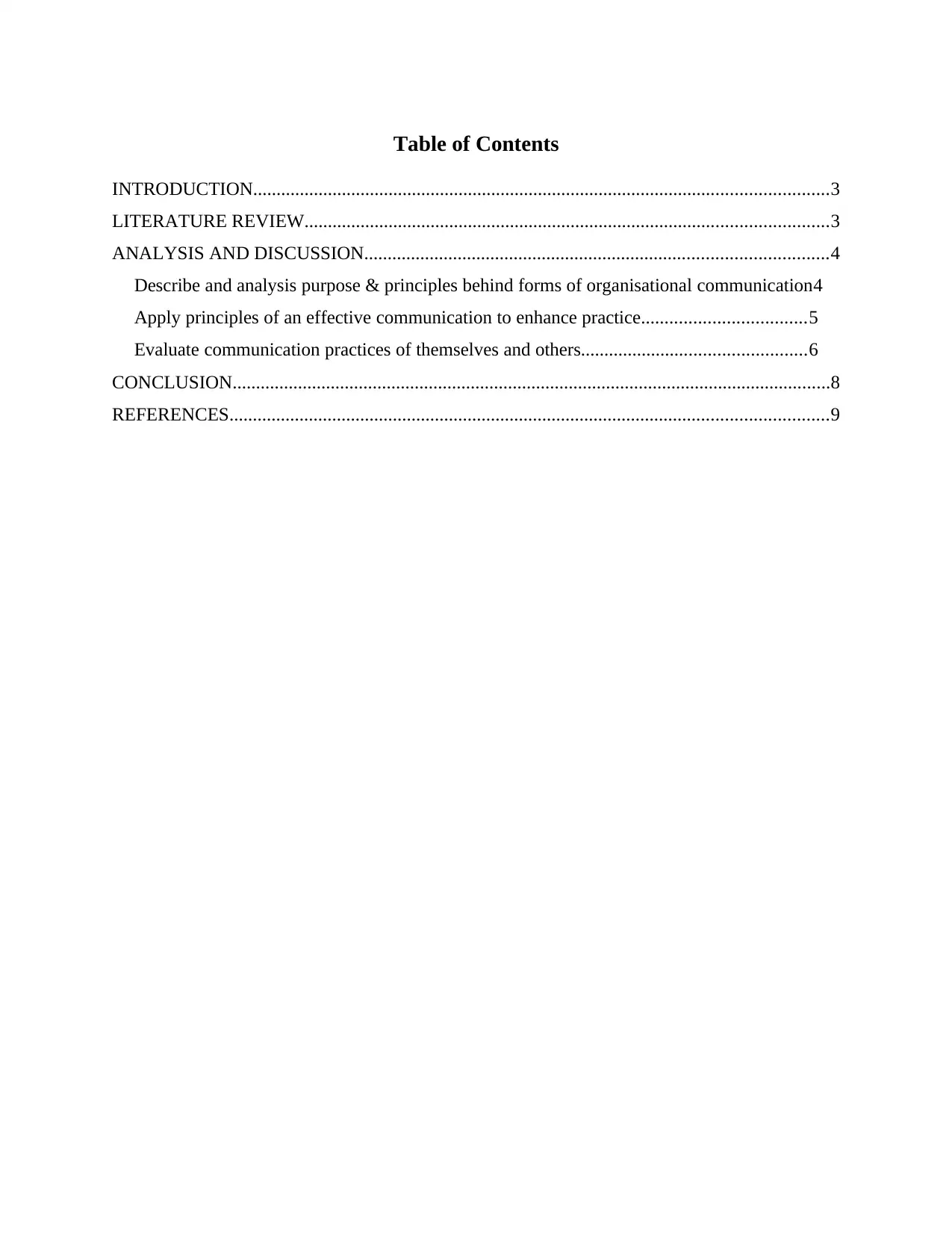
Table of Contents
INTRODUCTION...........................................................................................................................3
LITERATURE REVIEW................................................................................................................3
ANALYSIS AND DISCUSSION...................................................................................................4
Describe and analysis purpose & principles behind forms of organisational communication4
Apply principles of an effective communication to enhance practice...................................5
Evaluate communication practices of themselves and others................................................6
CONCLUSION................................................................................................................................8
REFERENCES................................................................................................................................9
INTRODUCTION...........................................................................................................................3
LITERATURE REVIEW................................................................................................................3
ANALYSIS AND DISCUSSION...................................................................................................4
Describe and analysis purpose & principles behind forms of organisational communication4
Apply principles of an effective communication to enhance practice...................................5
Evaluate communication practices of themselves and others................................................6
CONCLUSION................................................................................................................................8
REFERENCES................................................................................................................................9
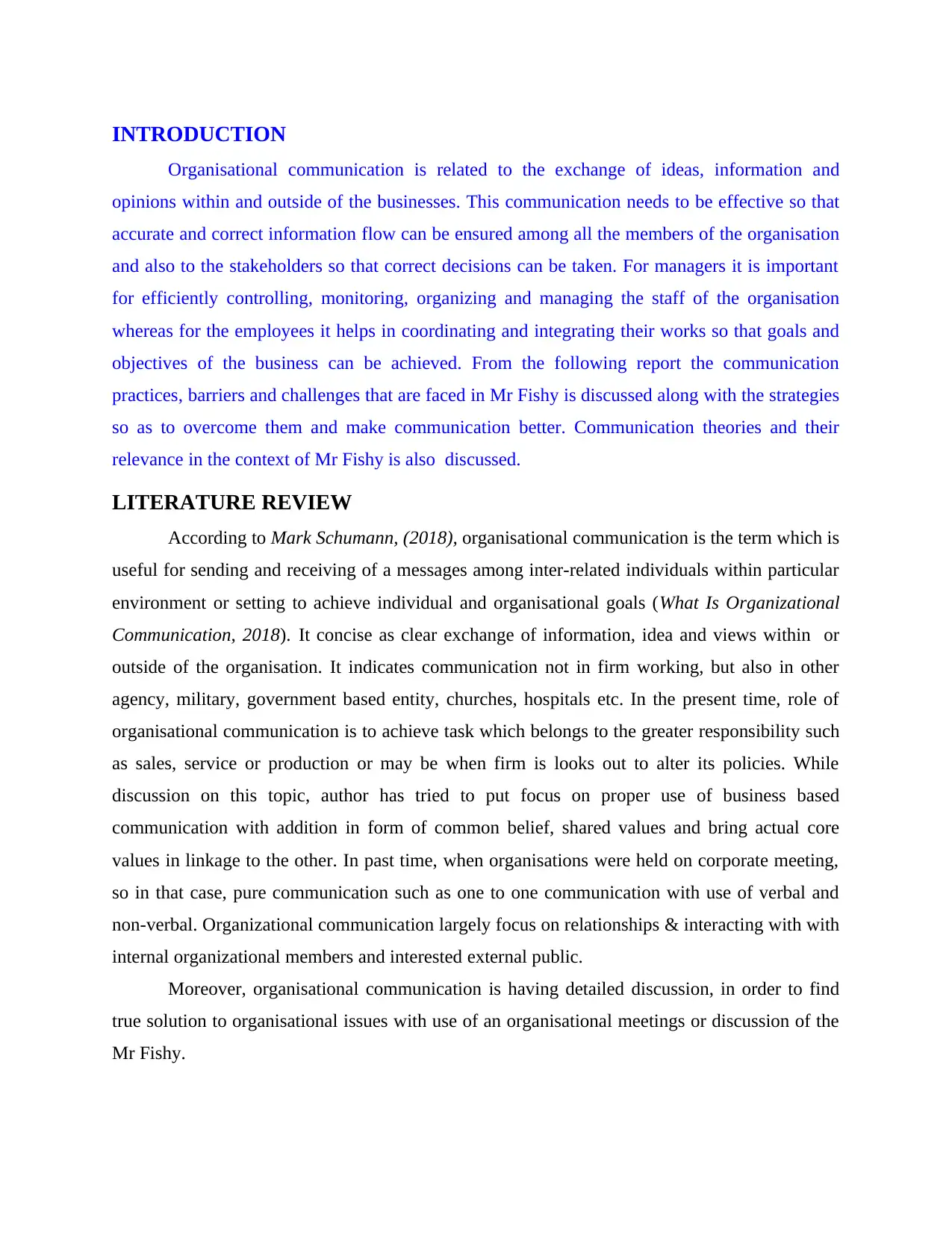
INTRODUCTION
Organisational communication is related to the exchange of ideas, information and
opinions within and outside of the businesses. This communication needs to be effective so that
accurate and correct information flow can be ensured among all the members of the organisation
and also to the stakeholders so that correct decisions can be taken. For managers it is important
for efficiently controlling, monitoring, organizing and managing the staff of the organisation
whereas for the employees it helps in coordinating and integrating their works so that goals and
objectives of the business can be achieved. From the following report the communication
practices, barriers and challenges that are faced in Mr Fishy is discussed along with the strategies
so as to overcome them and make communication better. Communication theories and their
relevance in the context of Mr Fishy is also discussed.
LITERATURE REVIEW
According to Mark Schumann, (2018), organisational communication is the term which is
useful for sending and receiving of a messages among inter-related individuals within particular
environment or setting to achieve individual and organisational goals (What Is Organizational
Communication, 2018). It concise as clear exchange of information, idea and views within or
outside of the organisation. It indicates communication not in firm working, but also in other
agency, military, government based entity, churches, hospitals etc. In the present time, role of
organisational communication is to achieve task which belongs to the greater responsibility such
as sales, service or production or may be when firm is looks out to alter its policies. While
discussion on this topic, author has tried to put focus on proper use of business based
communication with addition in form of common belief, shared values and bring actual core
values in linkage to the other. In past time, when organisations were held on corporate meeting,
so in that case, pure communication such as one to one communication with use of verbal and
non-verbal. Organizational communication largely focus on relationships & interacting with with
internal organizational members and interested external public.
Moreover, organisational communication is having detailed discussion, in order to find
true solution to organisational issues with use of an organisational meetings or discussion of the
Mr Fishy.
Organisational communication is related to the exchange of ideas, information and
opinions within and outside of the businesses. This communication needs to be effective so that
accurate and correct information flow can be ensured among all the members of the organisation
and also to the stakeholders so that correct decisions can be taken. For managers it is important
for efficiently controlling, monitoring, organizing and managing the staff of the organisation
whereas for the employees it helps in coordinating and integrating their works so that goals and
objectives of the business can be achieved. From the following report the communication
practices, barriers and challenges that are faced in Mr Fishy is discussed along with the strategies
so as to overcome them and make communication better. Communication theories and their
relevance in the context of Mr Fishy is also discussed.
LITERATURE REVIEW
According to Mark Schumann, (2018), organisational communication is the term which is
useful for sending and receiving of a messages among inter-related individuals within particular
environment or setting to achieve individual and organisational goals (What Is Organizational
Communication, 2018). It concise as clear exchange of information, idea and views within or
outside of the organisation. It indicates communication not in firm working, but also in other
agency, military, government based entity, churches, hospitals etc. In the present time, role of
organisational communication is to achieve task which belongs to the greater responsibility such
as sales, service or production or may be when firm is looks out to alter its policies. While
discussion on this topic, author has tried to put focus on proper use of business based
communication with addition in form of common belief, shared values and bring actual core
values in linkage to the other. In past time, when organisations were held on corporate meeting,
so in that case, pure communication such as one to one communication with use of verbal and
non-verbal. Organizational communication largely focus on relationships & interacting with with
internal organizational members and interested external public.
Moreover, organisational communication is having detailed discussion, in order to find
true solution to organisational issues with use of an organisational meetings or discussion of the
Mr Fishy.
⊘ This is a preview!⊘
Do you want full access?
Subscribe today to unlock all pages.

Trusted by 1+ million students worldwide
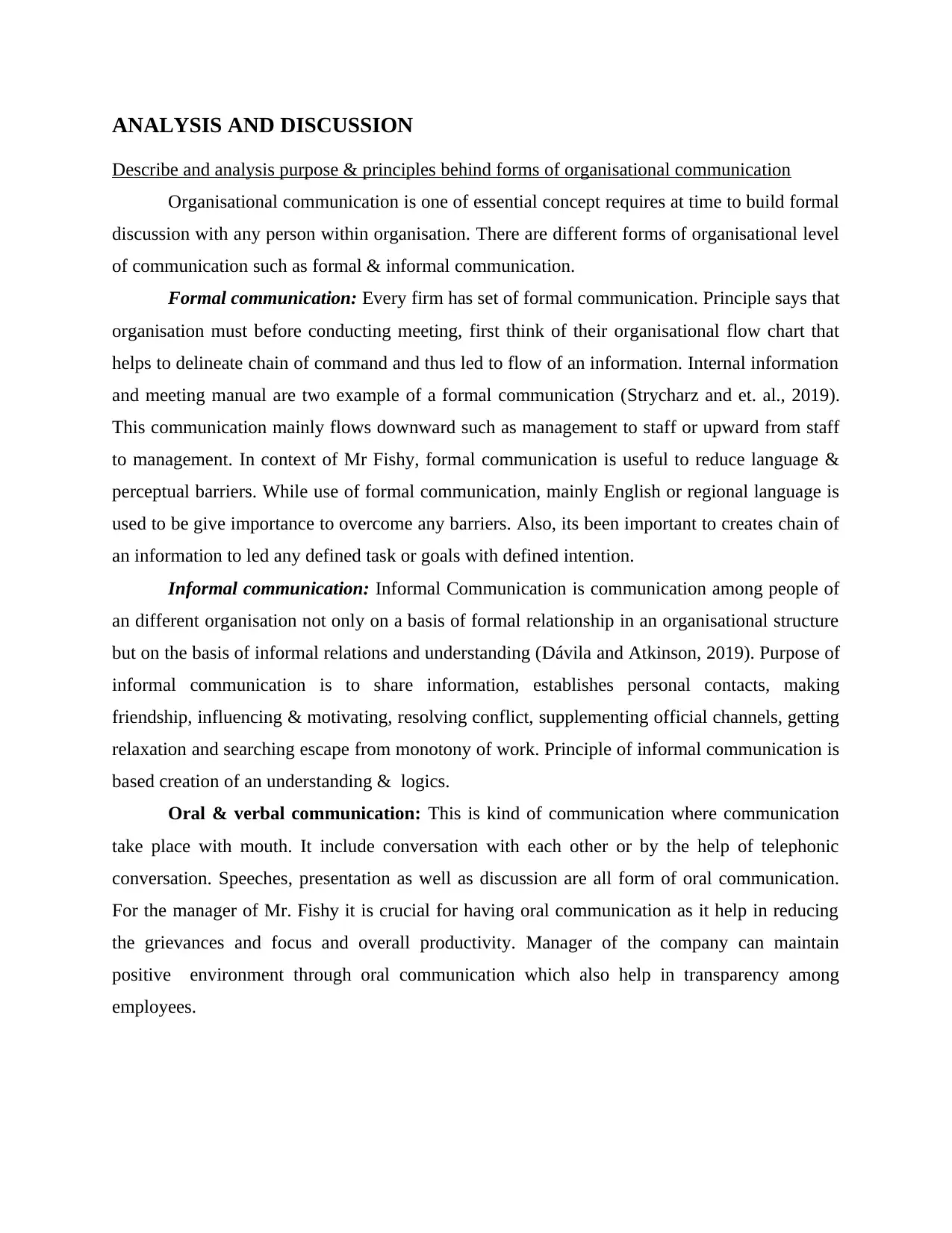
ANALYSIS AND DISCUSSION
Describe and analysis purpose & principles behind forms of organisational communication
Organisational communication is one of essential concept requires at time to build formal
discussion with any person within organisation. There are different forms of organisational level
of communication such as formal & informal communication.
Formal communication: Every firm has set of formal communication. Principle says that
organisation must before conducting meeting, first think of their organisational flow chart that
helps to delineate chain of command and thus led to flow of an information. Internal information
and meeting manual are two example of a formal communication (Strycharz and et. al., 2019).
This communication mainly flows downward such as management to staff or upward from staff
to management. In context of Mr Fishy, formal communication is useful to reduce language &
perceptual barriers. While use of formal communication, mainly English or regional language is
used to be give importance to overcome any barriers. Also, its been important to creates chain of
an information to led any defined task or goals with defined intention.
Informal communication: Informal Communication is communication among people of
an different organisation not only on a basis of formal relationship in an organisational structure
but on the basis of informal relations and understanding (Dávila and Atkinson, 2019). Purpose of
informal communication is to share information, establishes personal contacts, making
friendship, influencing & motivating, resolving conflict, supplementing official channels, getting
relaxation and searching escape from monotony of work. Principle of informal communication is
based creation of an understanding & logics.
Oral & verbal communication: This is kind of communication where communication
take place with mouth. It include conversation with each other or by the help of telephonic
conversation. Speeches, presentation as well as discussion are all form of oral communication.
For the manager of Mr. Fishy it is crucial for having oral communication as it help in reducing
the grievances and focus and overall productivity. Manager of the company can maintain
positive environment through oral communication which also help in transparency among
employees.
Describe and analysis purpose & principles behind forms of organisational communication
Organisational communication is one of essential concept requires at time to build formal
discussion with any person within organisation. There are different forms of organisational level
of communication such as formal & informal communication.
Formal communication: Every firm has set of formal communication. Principle says that
organisation must before conducting meeting, first think of their organisational flow chart that
helps to delineate chain of command and thus led to flow of an information. Internal information
and meeting manual are two example of a formal communication (Strycharz and et. al., 2019).
This communication mainly flows downward such as management to staff or upward from staff
to management. In context of Mr Fishy, formal communication is useful to reduce language &
perceptual barriers. While use of formal communication, mainly English or regional language is
used to be give importance to overcome any barriers. Also, its been important to creates chain of
an information to led any defined task or goals with defined intention.
Informal communication: Informal Communication is communication among people of
an different organisation not only on a basis of formal relationship in an organisational structure
but on the basis of informal relations and understanding (Dávila and Atkinson, 2019). Purpose of
informal communication is to share information, establishes personal contacts, making
friendship, influencing & motivating, resolving conflict, supplementing official channels, getting
relaxation and searching escape from monotony of work. Principle of informal communication is
based creation of an understanding & logics.
Oral & verbal communication: This is kind of communication where communication
take place with mouth. It include conversation with each other or by the help of telephonic
conversation. Speeches, presentation as well as discussion are all form of oral communication.
For the manager of Mr. Fishy it is crucial for having oral communication as it help in reducing
the grievances and focus and overall productivity. Manager of the company can maintain
positive environment through oral communication which also help in transparency among
employees.
Paraphrase This Document
Need a fresh take? Get an instant paraphrase of this document with our AI Paraphraser
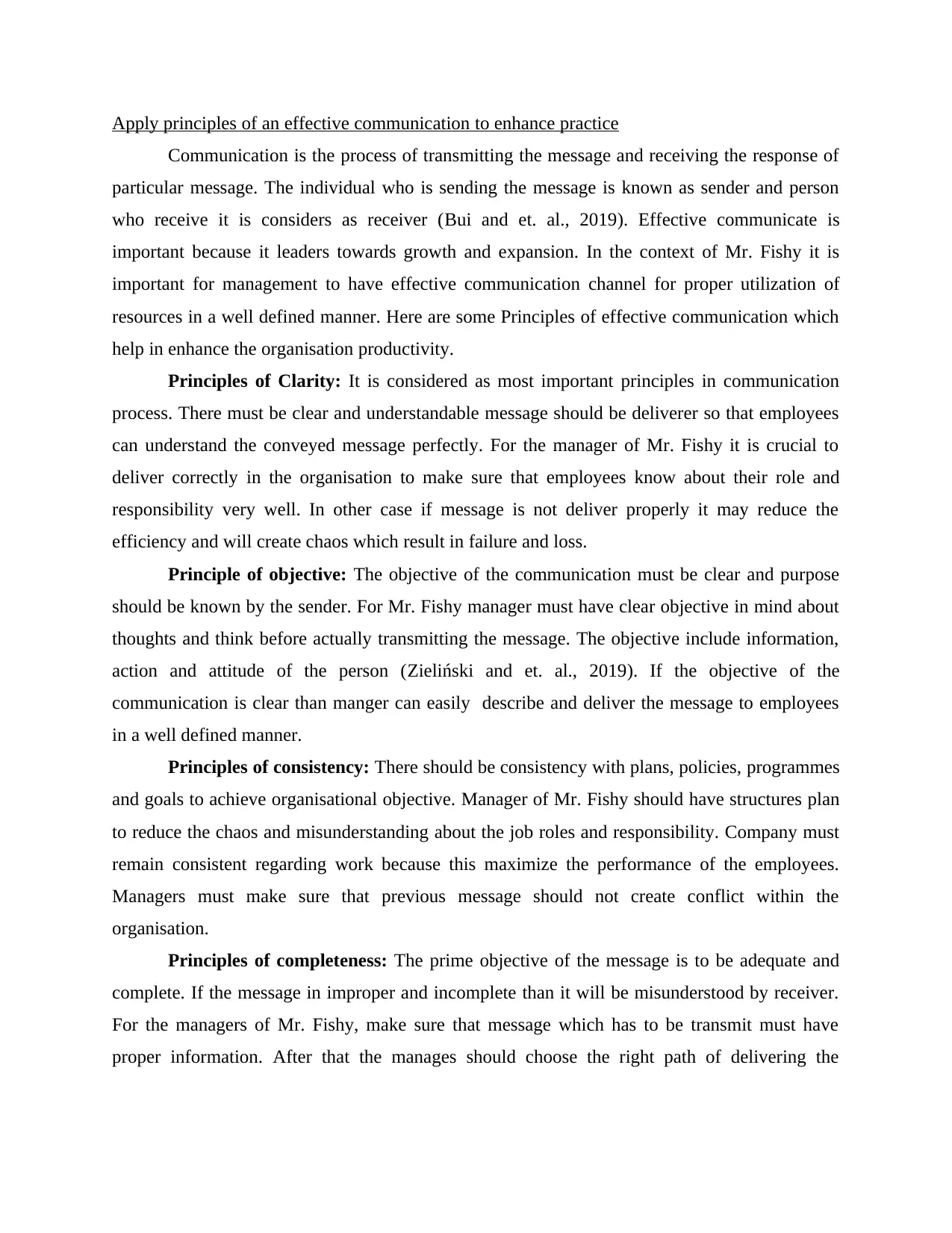
Apply principles of an effective communication to enhance practice
Communication is the process of transmitting the message and receiving the response of
particular message. The individual who is sending the message is known as sender and person
who receive it is considers as receiver (Bui and et. al., 2019). Effective communicate is
important because it leaders towards growth and expansion. In the context of Mr. Fishy it is
important for management to have effective communication channel for proper utilization of
resources in a well defined manner. Here are some Principles of effective communication which
help in enhance the organisation productivity.
Principles of Clarity: It is considered as most important principles in communication
process. There must be clear and understandable message should be deliverer so that employees
can understand the conveyed message perfectly. For the manager of Mr. Fishy it is crucial to
deliver correctly in the organisation to make sure that employees know about their role and
responsibility very well. In other case if message is not deliver properly it may reduce the
efficiency and will create chaos which result in failure and loss.
Principle of objective: The objective of the communication must be clear and purpose
should be known by the sender. For Mr. Fishy manager must have clear objective in mind about
thoughts and think before actually transmitting the message. The objective include information,
action and attitude of the person (Zieliński and et. al., 2019). If the objective of the
communication is clear than manger can easily describe and deliver the message to employees
in a well defined manner.
Principles of consistency: There should be consistency with plans, policies, programmes
and goals to achieve organisational objective. Manager of Mr. Fishy should have structures plan
to reduce the chaos and misunderstanding about the job roles and responsibility. Company must
remain consistent regarding work because this maximize the performance of the employees.
Managers must make sure that previous message should not create conflict within the
organisation.
Principles of completeness: The prime objective of the message is to be adequate and
complete. If the message in improper and incomplete than it will be misunderstood by receiver.
For the managers of Mr. Fishy, make sure that message which has to be transmit must have
proper information. After that the manages should choose the right path of delivering the
Communication is the process of transmitting the message and receiving the response of
particular message. The individual who is sending the message is known as sender and person
who receive it is considers as receiver (Bui and et. al., 2019). Effective communicate is
important because it leaders towards growth and expansion. In the context of Mr. Fishy it is
important for management to have effective communication channel for proper utilization of
resources in a well defined manner. Here are some Principles of effective communication which
help in enhance the organisation productivity.
Principles of Clarity: It is considered as most important principles in communication
process. There must be clear and understandable message should be deliverer so that employees
can understand the conveyed message perfectly. For the manager of Mr. Fishy it is crucial to
deliver correctly in the organisation to make sure that employees know about their role and
responsibility very well. In other case if message is not deliver properly it may reduce the
efficiency and will create chaos which result in failure and loss.
Principle of objective: The objective of the communication must be clear and purpose
should be known by the sender. For Mr. Fishy manager must have clear objective in mind about
thoughts and think before actually transmitting the message. The objective include information,
action and attitude of the person (Zieliński and et. al., 2019). If the objective of the
communication is clear than manger can easily describe and deliver the message to employees
in a well defined manner.
Principles of consistency: There should be consistency with plans, policies, programmes
and goals to achieve organisational objective. Manager of Mr. Fishy should have structures plan
to reduce the chaos and misunderstanding about the job roles and responsibility. Company must
remain consistent regarding work because this maximize the performance of the employees.
Managers must make sure that previous message should not create conflict within the
organisation.
Principles of completeness: The prime objective of the message is to be adequate and
complete. If the message in improper and incomplete than it will be misunderstood by receiver.
For the managers of Mr. Fishy, make sure that message which has to be transmit must have
proper information. After that the manages should choose the right path of delivering the
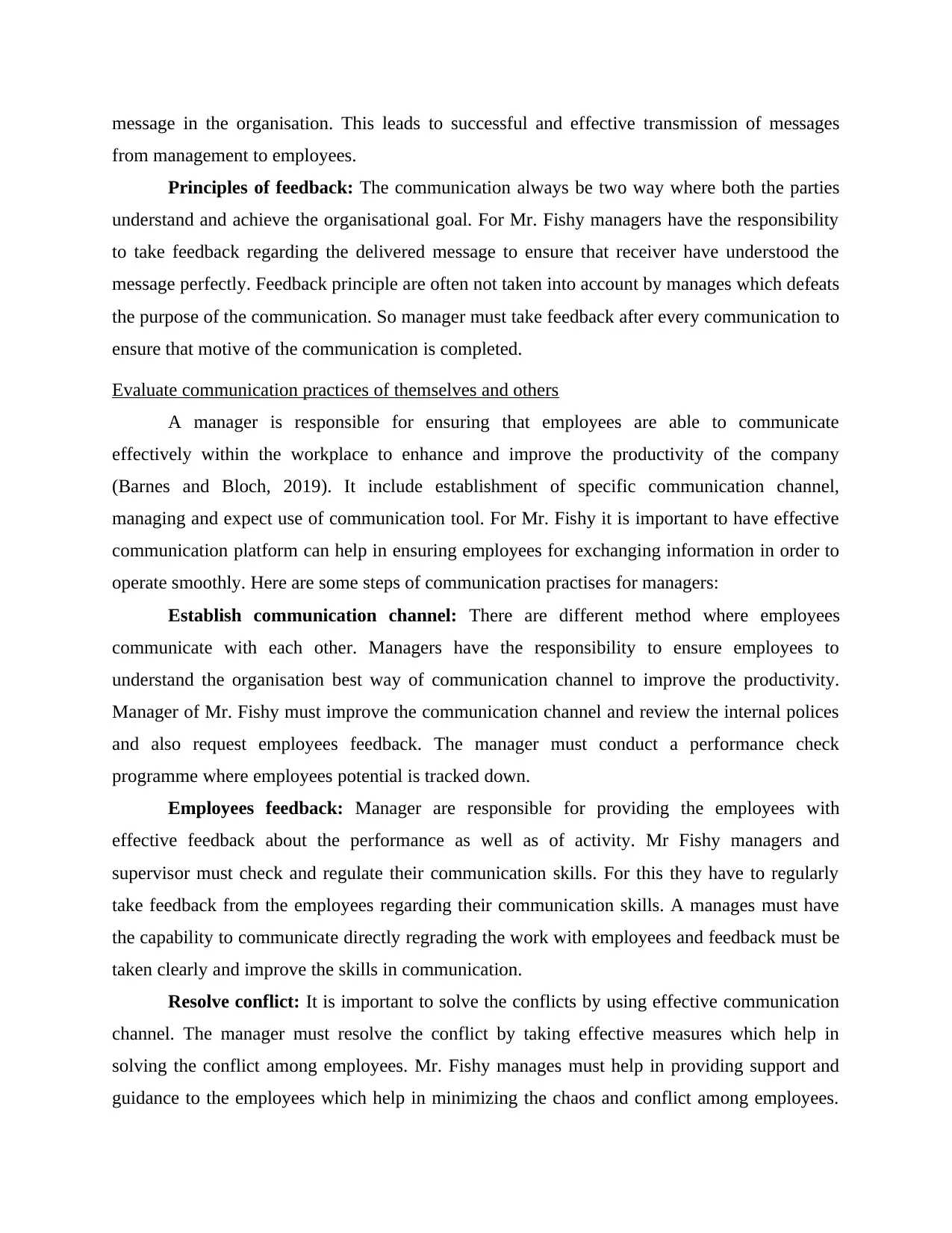
message in the organisation. This leads to successful and effective transmission of messages
from management to employees.
Principles of feedback: The communication always be two way where both the parties
understand and achieve the organisational goal. For Mr. Fishy managers have the responsibility
to take feedback regarding the delivered message to ensure that receiver have understood the
message perfectly. Feedback principle are often not taken into account by manages which defeats
the purpose of the communication. So manager must take feedback after every communication to
ensure that motive of the communication is completed.
Evaluate communication practices of themselves and others
A manager is responsible for ensuring that employees are able to communicate
effectively within the workplace to enhance and improve the productivity of the company
(Barnes and Bloch, 2019). It include establishment of specific communication channel,
managing and expect use of communication tool. For Mr. Fishy it is important to have effective
communication platform can help in ensuring employees for exchanging information in order to
operate smoothly. Here are some steps of communication practises for managers:
Establish communication channel: There are different method where employees
communicate with each other. Managers have the responsibility to ensure employees to
understand the organisation best way of communication channel to improve the productivity.
Manager of Mr. Fishy must improve the communication channel and review the internal polices
and also request employees feedback. The manager must conduct a performance check
programme where employees potential is tracked down.
Employees feedback: Manager are responsible for providing the employees with
effective feedback about the performance as well as of activity. Mr Fishy managers and
supervisor must check and regulate their communication skills. For this they have to regularly
take feedback from the employees regarding their communication skills. A manages must have
the capability to communicate directly regrading the work with employees and feedback must be
taken clearly and improve the skills in communication.
Resolve conflict: It is important to solve the conflicts by using effective communication
channel. The manager must resolve the conflict by taking effective measures which help in
solving the conflict among employees. Mr. Fishy manages must help in providing support and
guidance to the employees which help in minimizing the chaos and conflict among employees.
from management to employees.
Principles of feedback: The communication always be two way where both the parties
understand and achieve the organisational goal. For Mr. Fishy managers have the responsibility
to take feedback regarding the delivered message to ensure that receiver have understood the
message perfectly. Feedback principle are often not taken into account by manages which defeats
the purpose of the communication. So manager must take feedback after every communication to
ensure that motive of the communication is completed.
Evaluate communication practices of themselves and others
A manager is responsible for ensuring that employees are able to communicate
effectively within the workplace to enhance and improve the productivity of the company
(Barnes and Bloch, 2019). It include establishment of specific communication channel,
managing and expect use of communication tool. For Mr. Fishy it is important to have effective
communication platform can help in ensuring employees for exchanging information in order to
operate smoothly. Here are some steps of communication practises for managers:
Establish communication channel: There are different method where employees
communicate with each other. Managers have the responsibility to ensure employees to
understand the organisation best way of communication channel to improve the productivity.
Manager of Mr. Fishy must improve the communication channel and review the internal polices
and also request employees feedback. The manager must conduct a performance check
programme where employees potential is tracked down.
Employees feedback: Manager are responsible for providing the employees with
effective feedback about the performance as well as of activity. Mr Fishy managers and
supervisor must check and regulate their communication skills. For this they have to regularly
take feedback from the employees regarding their communication skills. A manages must have
the capability to communicate directly regrading the work with employees and feedback must be
taken clearly and improve the skills in communication.
Resolve conflict: It is important to solve the conflicts by using effective communication
channel. The manager must resolve the conflict by taking effective measures which help in
solving the conflict among employees. Mr. Fishy manages must help in providing support and
guidance to the employees which help in minimizing the chaos and conflict among employees.
⊘ This is a preview!⊘
Do you want full access?
Subscribe today to unlock all pages.

Trusted by 1+ million students worldwide
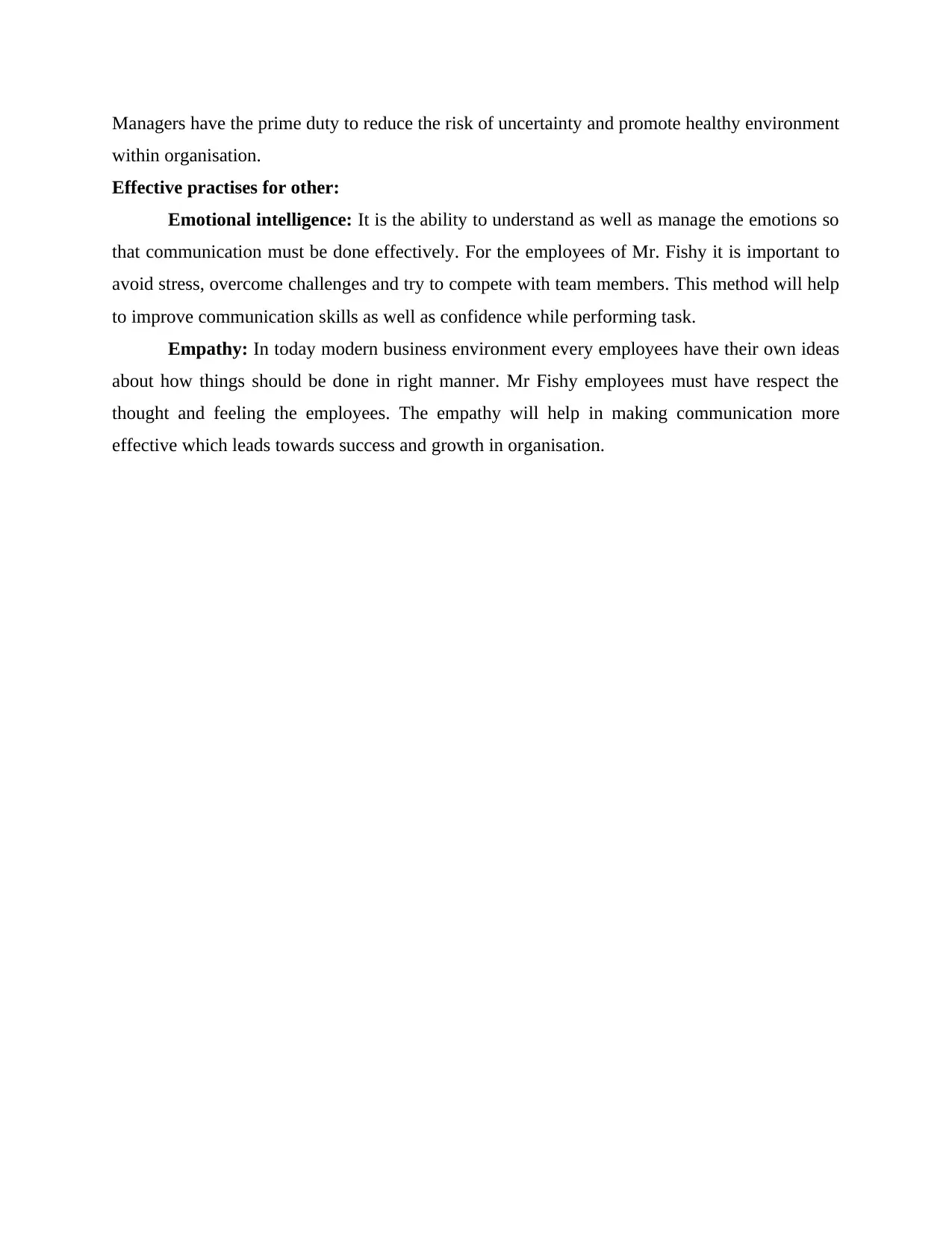
Managers have the prime duty to reduce the risk of uncertainty and promote healthy environment
within organisation.
Effective practises for other:
Emotional intelligence: It is the ability to understand as well as manage the emotions so
that communication must be done effectively. For the employees of Mr. Fishy it is important to
avoid stress, overcome challenges and try to compete with team members. This method will help
to improve communication skills as well as confidence while performing task.
Empathy: In today modern business environment every employees have their own ideas
about how things should be done in right manner. Mr Fishy employees must have respect the
thought and feeling the employees. The empathy will help in making communication more
effective which leads towards success and growth in organisation.
within organisation.
Effective practises for other:
Emotional intelligence: It is the ability to understand as well as manage the emotions so
that communication must be done effectively. For the employees of Mr. Fishy it is important to
avoid stress, overcome challenges and try to compete with team members. This method will help
to improve communication skills as well as confidence while performing task.
Empathy: In today modern business environment every employees have their own ideas
about how things should be done in right manner. Mr Fishy employees must have respect the
thought and feeling the employees. The empathy will help in making communication more
effective which leads towards success and growth in organisation.
Paraphrase This Document
Need a fresh take? Get an instant paraphrase of this document with our AI Paraphraser
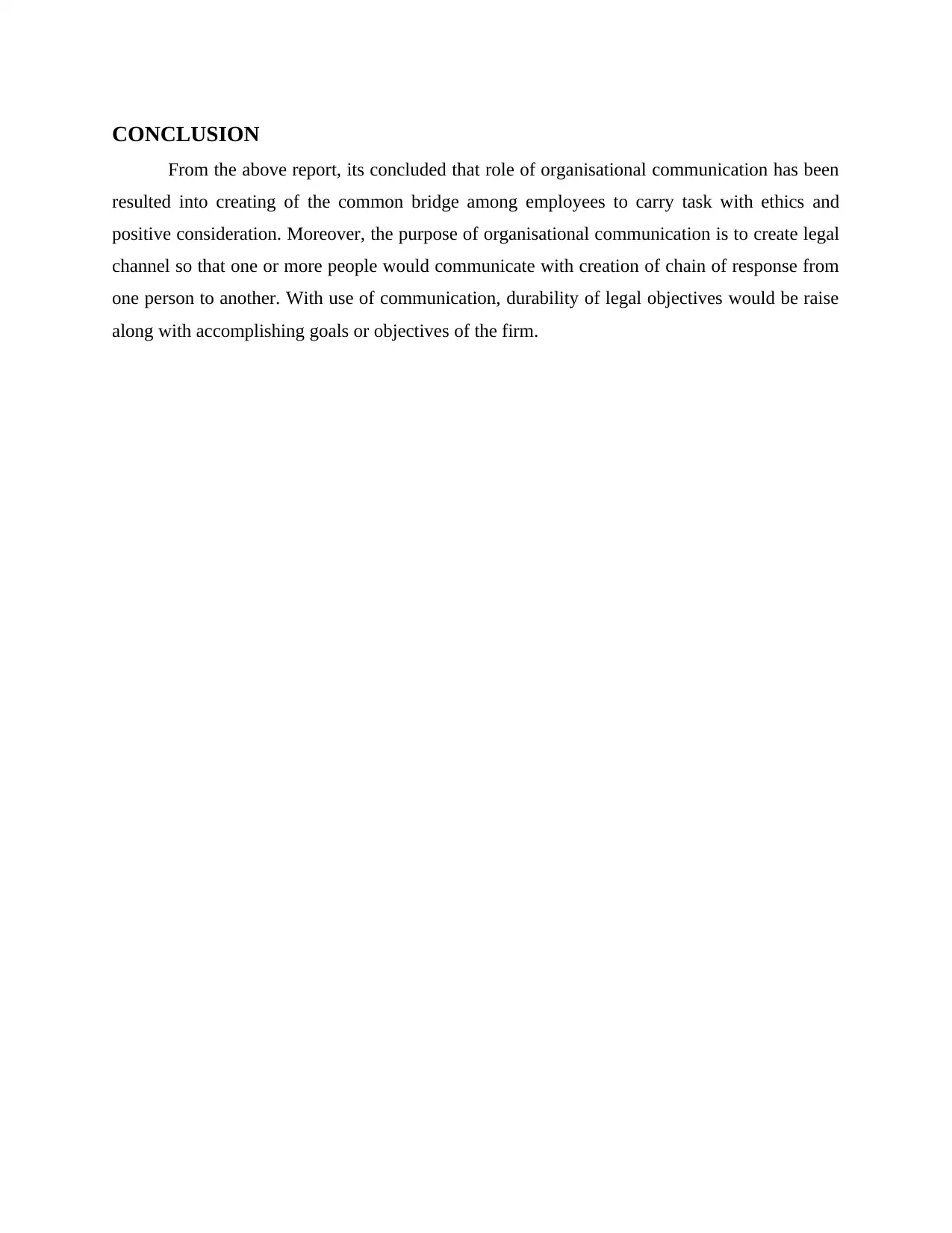
CONCLUSION
From the above report, its concluded that role of organisational communication has been
resulted into creating of the common bridge among employees to carry task with ethics and
positive consideration. Moreover, the purpose of organisational communication is to create legal
channel so that one or more people would communicate with creation of chain of response from
one person to another. With use of communication, durability of legal objectives would be raise
along with accomplishing goals or objectives of the firm.
From the above report, its concluded that role of organisational communication has been
resulted into creating of the common bridge among employees to carry task with ethics and
positive consideration. Moreover, the purpose of organisational communication is to create legal
channel so that one or more people would communicate with creation of chain of response from
one person to another. With use of communication, durability of legal objectives would be raise
along with accomplishing goals or objectives of the firm.
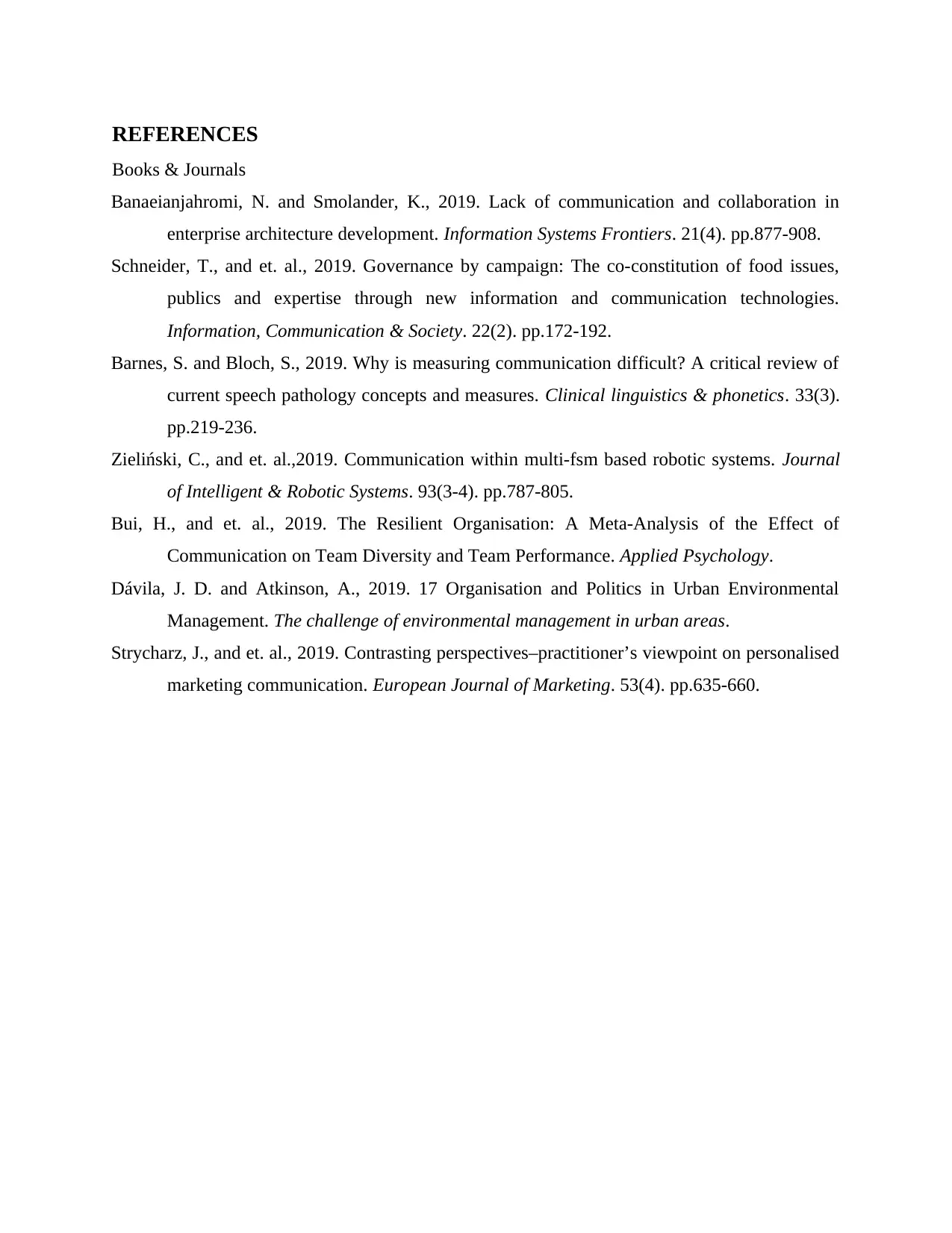
REFERENCES
Books & Journals
Banaeianjahromi, N. and Smolander, K., 2019. Lack of communication and collaboration in
enterprise architecture development. Information Systems Frontiers. 21(4). pp.877-908.
Schneider, T., and et. al., 2019. Governance by campaign: The co-constitution of food issues,
publics and expertise through new information and communication technologies.
Information, Communication & Society. 22(2). pp.172-192.
Barnes, S. and Bloch, S., 2019. Why is measuring communication difficult? A critical review of
current speech pathology concepts and measures. Clinical linguistics & phonetics. 33(3).
pp.219-236.
Zieliński, C., and et. al.,2019. Communication within multi-fsm based robotic systems. Journal
of Intelligent & Robotic Systems. 93(3-4). pp.787-805.
Bui, H., and et. al., 2019. The Resilient Organisation: A Meta‐Analysis of the Effect of
Communication on Team Diversity and Team Performance. Applied Psychology.
Dávila, J. D. and Atkinson, A., 2019. 17 Organisation and Politics in Urban Environmental
Management. The challenge of environmental management in urban areas.
Strycharz, J., and et. al., 2019. Contrasting perspectives–practitioner’s viewpoint on personalised
marketing communication. European Journal of Marketing. 53(4). pp.635-660.
Books & Journals
Banaeianjahromi, N. and Smolander, K., 2019. Lack of communication and collaboration in
enterprise architecture development. Information Systems Frontiers. 21(4). pp.877-908.
Schneider, T., and et. al., 2019. Governance by campaign: The co-constitution of food issues,
publics and expertise through new information and communication technologies.
Information, Communication & Society. 22(2). pp.172-192.
Barnes, S. and Bloch, S., 2019. Why is measuring communication difficult? A critical review of
current speech pathology concepts and measures. Clinical linguistics & phonetics. 33(3).
pp.219-236.
Zieliński, C., and et. al.,2019. Communication within multi-fsm based robotic systems. Journal
of Intelligent & Robotic Systems. 93(3-4). pp.787-805.
Bui, H., and et. al., 2019. The Resilient Organisation: A Meta‐Analysis of the Effect of
Communication on Team Diversity and Team Performance. Applied Psychology.
Dávila, J. D. and Atkinson, A., 2019. 17 Organisation and Politics in Urban Environmental
Management. The challenge of environmental management in urban areas.
Strycharz, J., and et. al., 2019. Contrasting perspectives–practitioner’s viewpoint on personalised
marketing communication. European Journal of Marketing. 53(4). pp.635-660.
⊘ This is a preview!⊘
Do you want full access?
Subscribe today to unlock all pages.

Trusted by 1+ million students worldwide
1 out of 9
Related Documents
Your All-in-One AI-Powered Toolkit for Academic Success.
+13062052269
info@desklib.com
Available 24*7 on WhatsApp / Email
![[object Object]](/_next/static/media/star-bottom.7253800d.svg)
Unlock your academic potential
Copyright © 2020–2026 A2Z Services. All Rights Reserved. Developed and managed by ZUCOL.





